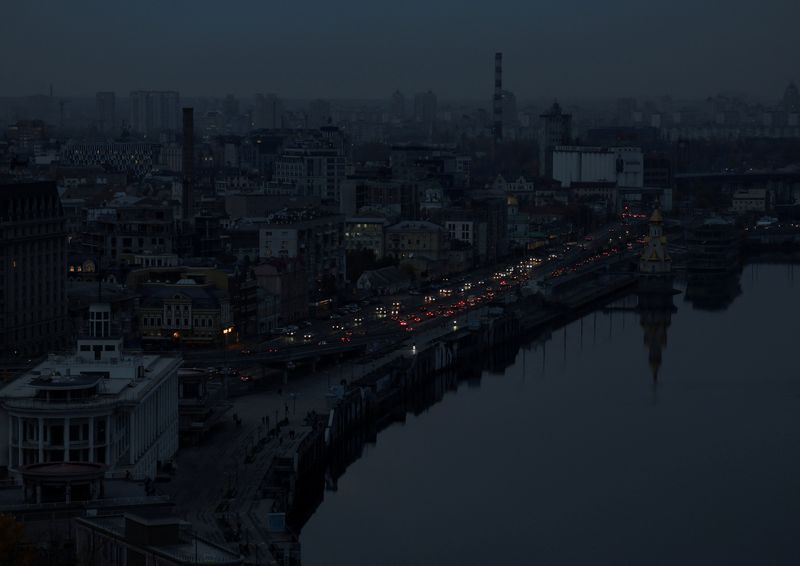The energy crisis in Ukraine has hit the economy hard
2022.11.18 11:32
[ad_1]

The energy crisis in Ukraine has hit the economy hard
Budrigannews.com – Oleksii Revutskyi rolls his eyes when talking about the challenges that Ukrainian companies are facing recently.
“Two years of quarantine, years of war – already bring to foreigners,” Revutskyi, a Kiev-style expert who can quickly find himself dependent on the generator, if Russian air strikes continue.
withstood the pandemic, and then the economic crisis that followed Feb in Russia. 24. Aggression, Ukrainian companies are struggling to adapt to the widespread blackouts that have become a feature of everyday life.
As losses on the battlefield, the Russian military is increasingly launching missiles at critical infrastructure, such as power plants and substations, to maintain the stability of the power grid and complete repairs.
Officials said Tuesday’s wave of attacks was the largest in nine months of war. Russia has said that the strikes on Ukraine are aimed at military and energy infrastructure.
For enterprises, especially small and medium-sized enterprises (SMEs), which accounted for about 60% of the Ukrainian economy and accounted for about 40% of the tax revenues before the invasion, periodic stoppages are associated with the loss of income and the need to plan in advance.
Kateryna Markevych, chief expert of the economic and social program of the Razumkov Center think tank in Kiev, said that the activity of small and medium-sized enterprises has “deteriorated significantly” since the Russian strike began in mid-March.
She added that many have splurged on accessories like generators or been forced to make expensive concessions to keep customers.
Those who lack a financial “safety cushion”, or are unable to secure a favorable line of credit in the war-torn economy of Ukraine, can suspend operations or close completely, she said.
Last week, Ukrainian Economy Minister Yulia Svyrydenko told reporters that Russia’s strike on critical infrastructure this year could lead to a larger economic contraction than the 35% that was originally expected.
“This is not business”
Revutskyi said that his collaborative space, Kooperativ, had attracted new visitors since advertising the fact that it was served by two different power lines and Internet providers, which could avoid most outages.
In the end, however, the inflow will not offset the cost of running one of the 2 generators for a long time if necessary, he said.
In addition, it was difficult to hold events amid frequent air raid warnings.
Last month, the chairman of the Committee on Finance, Tax and Customs Policy of the Ukrainian Parliament said that the economy will lose more than 200 million every time the national alert lasted the entire working day.
“Yes, we have survived,” said Revutskyi in the loft space. “But this is not a business.”
Some large companies appear to be better equipped to deal with uncertainty.
However, small businesses, especially those in the service industry, are under more pressure, often relying on factors like client loyalty or a break from the landlord.
Get in
Sashko Borovsky, who co-owns two hip Kiev cafes and runs another, said his business had benefited both. The agility given to him by having a small staff also helped.
During a snap or planned stop, the employee shifts to another role: the cashier becomes greeters politely turning the customer, and the cook becomes “cold” like making a sandwich.
“Hatred, anger – these feelings last for a few minutes,” Borovsky said, describing the first moments after the Russian airstrike to knock out forces. “And then you clear them up and start thinking constructively.”
But his project generated much less revenue during the outage, and while he held weekly tactical meetings, he planned his finances more than six weeks ago.
Some experts warn that stabilizing the Ukrainian energy grid will be a long-term effort.
Oleksandr Kharchenko, director of the Center for Energy Industry Research in Kiev, said this week that it will take 6 weeks for repairs to be completed enough for most customers to experience a minimal cut-off.
“But we just assume there will be no more attacks,” he said the day before Russia launched a new attack on its energy facilities and defense plants.
Meanwhile, companies in cities close to combat are more severely affected by the flight of potential customers.
Oleksandr Chumak, president of the Association of Private Employers of Kharkov, estimates that the population of the city of more than 1 million people has plunged to around 600,000 today.
“This makes it impossible for some of them to survive,”” he said.
Chumak added that 12% of the companies that have left Kharkov have already decided to return, and another 21% will return if they can secure safe and adequate funding.
“I made peace with this”
Still, both Borovsky and Revutskyi said that many Ukrainians are now adapting to various difficulties, so neither they nor their colleagues were still panicking. Kiev’s military success also helped to maintain a sense of purpose among the population.
A survey by the Ukrainian market research firm Gradus found that 65% of companies believed that the active battle would end by the end of 2023 at the latest. The survey was conducted in early May 11 and included 203 respondents representing small and medium-sized enterprises in Ukraine.
For now, Borovsky said, he is more obsessed with the mental health of him and others than with the potential economic losses he might suffer.
“This is something I can control in that moment – not the future of my business,” he said. “I made peace with this, and it has become easier for me.”
[ad_2]








